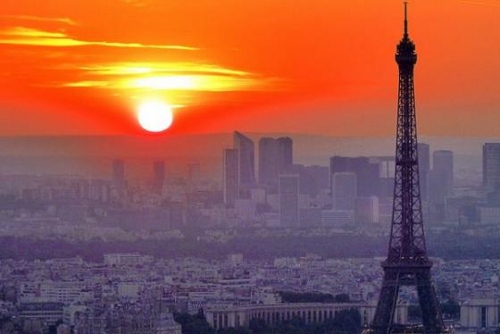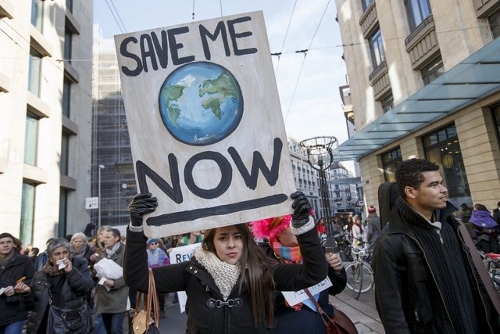CWI leaflet to mass protests outside Paris Climate Conference
The Paris Climate Conference with representatives of more than 190 governments is meeting with the whole world watching. Mass protests – angry over repeated inaction and betrayals by governments – took to the streets of Paris despite the French government’s ban on protests under its three month state of emergency. The following is the text of the leaflet given out in Paris by members of the Committee for a Workers’ International (CWI) joining the protests from several countries.
This year, 2015, is the warmest year globally since 1850 and the world temperature is on track to increase by four degrees before 2100, the UN warns. This would be twice the maximum limit estimated to avoid the worst human and ecological catastrophes.
Despite their superficial optimism, governments meeting in Paris will offer no solution to this threat, since it is caused by their policies, many of them dictated by Big Oil, other multinationals and the workings of the capitalist system itself. The way forward is to combine the increasing number of battles to save the environment with working class struggles on wages and conditions around a democratic socialist programme.
Every struggle for the environment will meet the fiercest resistance of the capitalist system. Only 90 giant companies are responsible for 63 percent of the world’s total emissions of industrial carbon dioxide and methane 1851 to 2010, half of those emissions in the last 25 years.
In France today, 18 percent of industry accounts for 87 percent of greenhouse gas emissions; 46 percent of that is from just 21 sites. The example of Volkswagen is striking. They have used ecological concern as a selling point, while using special software to cheat pollution controls since 2009 – hiding emissions of up to 40 times the threshold allowed in the EU!
What is at risk?
- Increasing number of catastrophes such as Hurricane Haiyan in the Philippines in 2013. In 2014, 19 million people were displaced because of natural disasters,90 percent of those affected were in Asia.
- According to Nasa a sea level rise of one meter within 100-200 years is a realistic scenario, affecting at least 150 million people in Asia alone. Many others argue that a rise of one meter is far too conservative.
- At the same time, big parts of Central and South America, southern Africa, southern Australia, and countries around the Mediterranean Sea risk a rapid increase in droughts. The water supply for up to two billion people is at risk within 40-50 years as the ice and snow cover that provide it in Central Asia and elsewhere disappear.
Still unknown is the tempo of events. Scientists are warning of several tipping points, from where changes in nature are irreversible. Fundamentals to all life, including human life, such as coral reefs, mangroves and bees are in the process of being obliterated.

Climate change – the biggest failure of the capitalist market
The global temperature has now increased one degree Celsius since pre-industrial times, according to a new report from the Meteorological Office in Britain – the country’s national weather service.That is halfway towards the symbolic two degrees that has been the target ceiling that the UN has agreed. The last time the world was two degrees warmer than before industrialisation was 120,000 years ago, when the sea level was at least six meters higher than today.
The summits of the politicians have utterly failed to stop the destruction of the environment. Since 1992 in Rio de Janeiro, global carbon emission has doubled to reach more than 35 billion tonnes of carbon dioxide.
With the national pledges made by governments before the Paris summit, emissions will still reach 56.7bn tonnes by 2030. According to the UN’s optimistic prognosis, that would mean a temperature increase of 2.7 degrees.
Rich countries are only pledging one quarter of what is needed, according to the website Climate Fairshares.
What is proposed in Paris?
- Basically, it is “market solutions”, trading in emission rights that has failed in Europe, as companies have received almost unlimited emission quotas, will be extended to China, Korea, Japan and other countries.
- Nothing is compulsory. All pledges are voluntarily, there is no system for fines or punishment.
- There will be no limitation of existing subsidies to oil, coal and car industries.
Even small steps forward will also be in danger from every downturn in the world economy, where politicians will take measures to save their nation’s banks and big companies.
All other solutions discussed, such as increased capture and storage of carbon dioxide, are actually increasing the risks since they don’t predicate any real decrease of emissions.
Climate and environmental struggles
The massive campaign against the Keystone XL oil pipeline from Canada to the Mexican Gulf ended in victory this November after four years of struggle from activists, farmers, native americans and other local people.
In Melbourne, Socialist Party (CWI Australia) members played a key role when the massively polluting motorway project, East West Link, was stopped after massive protests, including demonstrations, picket lines and trade union participation. In Sweden, CWI members are involved in a similar struggle against Europe’s most expensive motorway tunnel.
Very important struggles are also conducted for example against gold mines in Greece, oil drilling in the Arctic, water shortages in São Paolo and fracking – which is banned in France.
The socialist point of departure
- The needs of human beings and the planet itself must be put before global capitalism’s hunt for profits.
- For a major shift from capitalist growth and development models based on the exploitation by multinational corporations’ of people and nature to popular decision-making and control over natural
- Within the framework of capitalism, there are no lasting solutions.
- There are only international solutions. The threat of climate change is not just an environmental issue; It must be seen as a question of social justice that stems from the theft of natural resources by rich countries and multinational corporations.

Organise and fight for socialism!
The capitalist system is taking us backwards; we must bring it down! We can fundamentally change things only through socialist revolutionary action like that in France in 1968. This should mean the owners of companies being expropriated and the key sectors of the economy being placed under the control of workers and the people by nationalising them. This should include the major energy companies, the food industry, ‘Big Pharma’, the car and transport industry, and many other major monopolies that dominate our lives, as well as the banks.
Having working people in control in society would change everything. We would then use quality materials to make more long-lasting products – goods that are also not hazardous to workers handling them or using them. 80 percent of fossil fuels must stay in the ground. Agriculture needs to be fundamentally changed. Investing in new, clean factories, in low cost public transport systems, housing and all efficient types of renewable energy: this is the only way a change-over could be carried through! This wouild mean planning for green, environment-friendly jobs. A new report from the International Trade Union for Construction and Woodworkers shows that green conversion is not only possible but would provide millions of new jobs to replace those in environment-damaging industries.
We already have the technical means to plan production according to our needs, not for profits; we can have rational management of all the resources on the planet. This means the fighting for a democratic socialist society, with the democratic planning of resources on an international scale.





